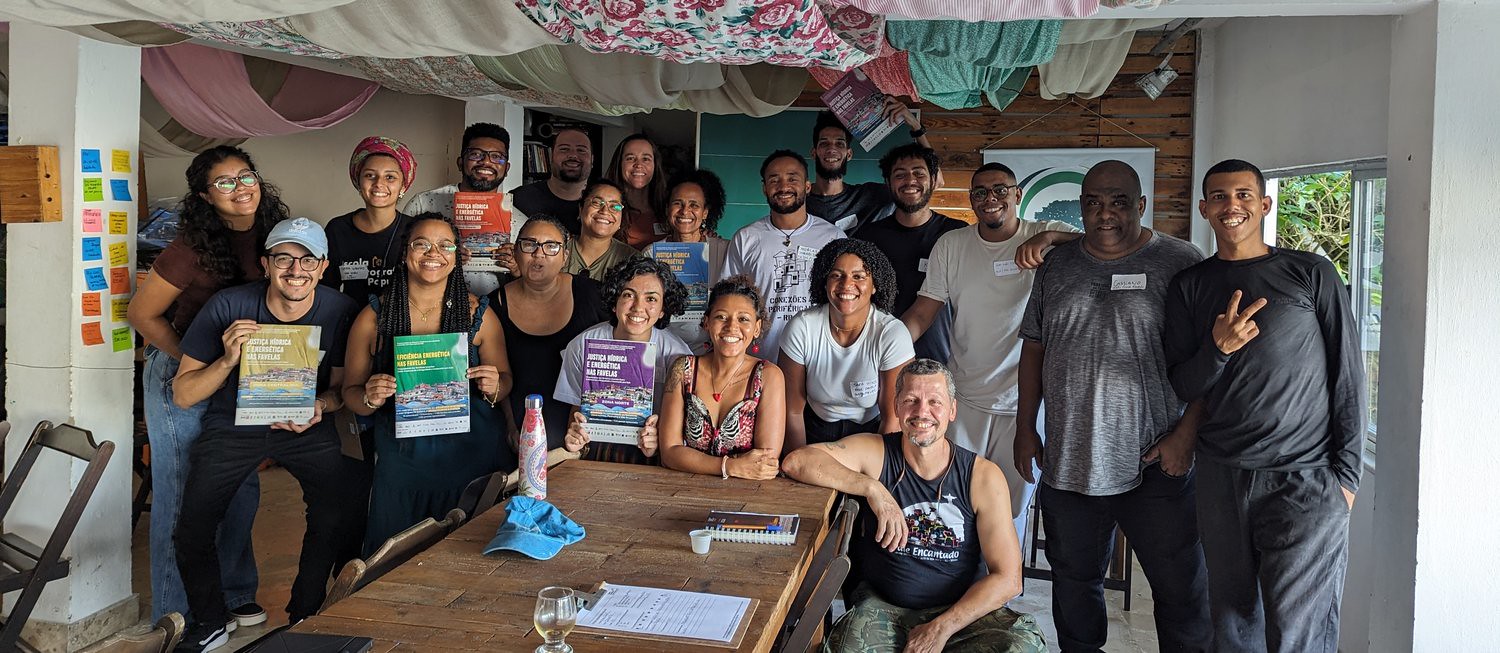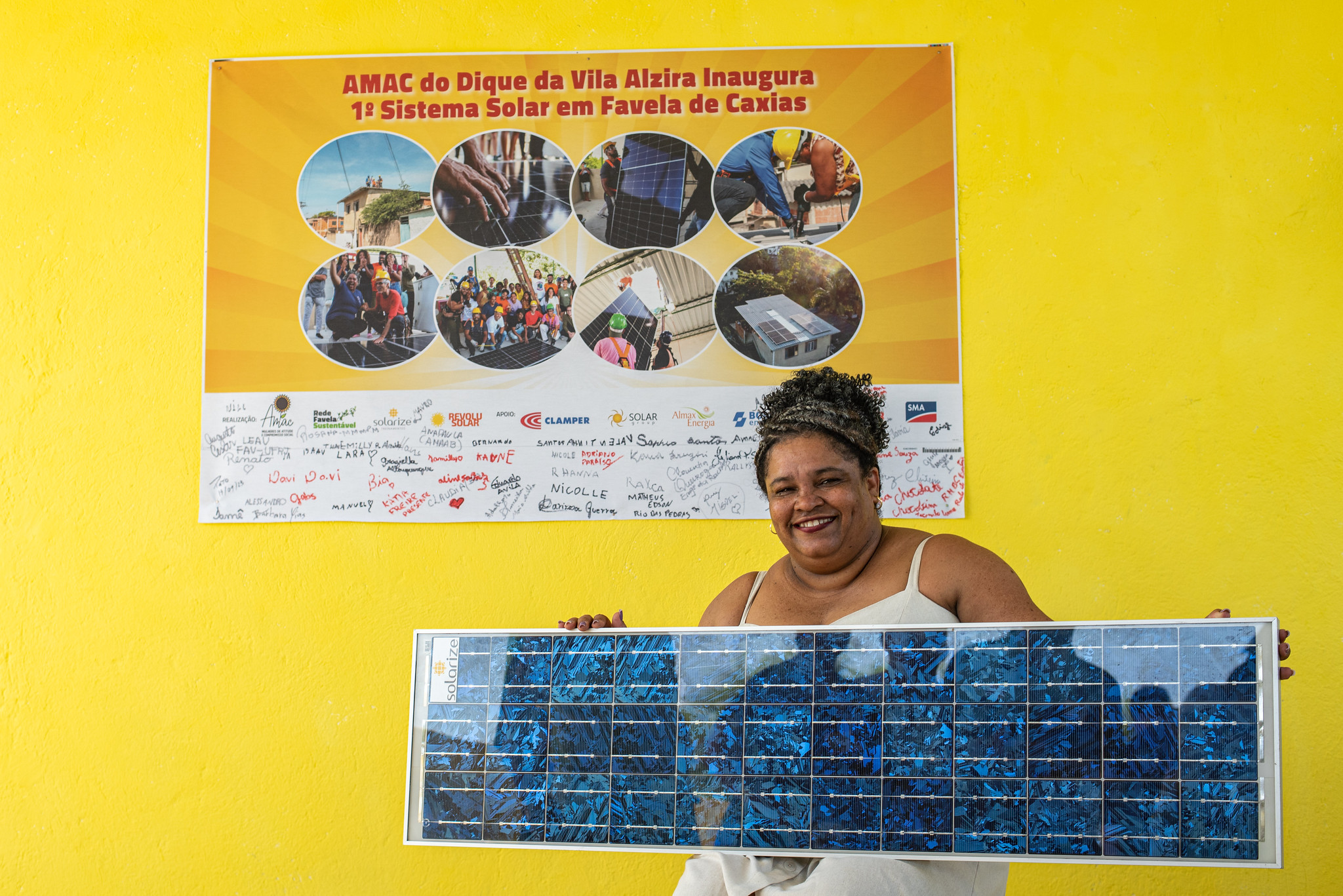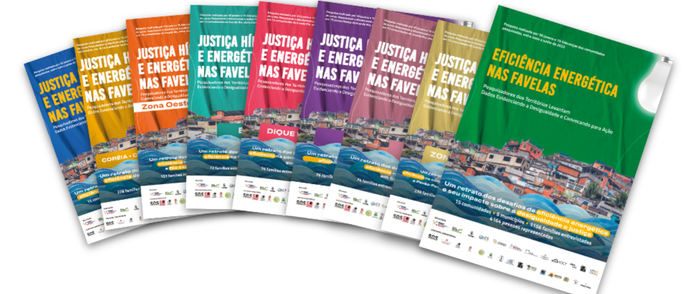THE DELEGATION OF 19 COMMUNITY ORGANIZERS REPRESENTING FAVELAS WITH 1.2 MILLION RESIDENTS HEADS TO BRASÍLIA FOR ENERGY JUSTICE
On May 27-29, World Energy Week, a delegation of 26 members of Rio de Janeiro’s Sustainable Favela Network* and partners, heads to Brasília for a series of activities at the National Congress, fighting for just and clean energy in the favelas. [PDF Version of Release]
Introduction to the Delegation and Schedule of Events
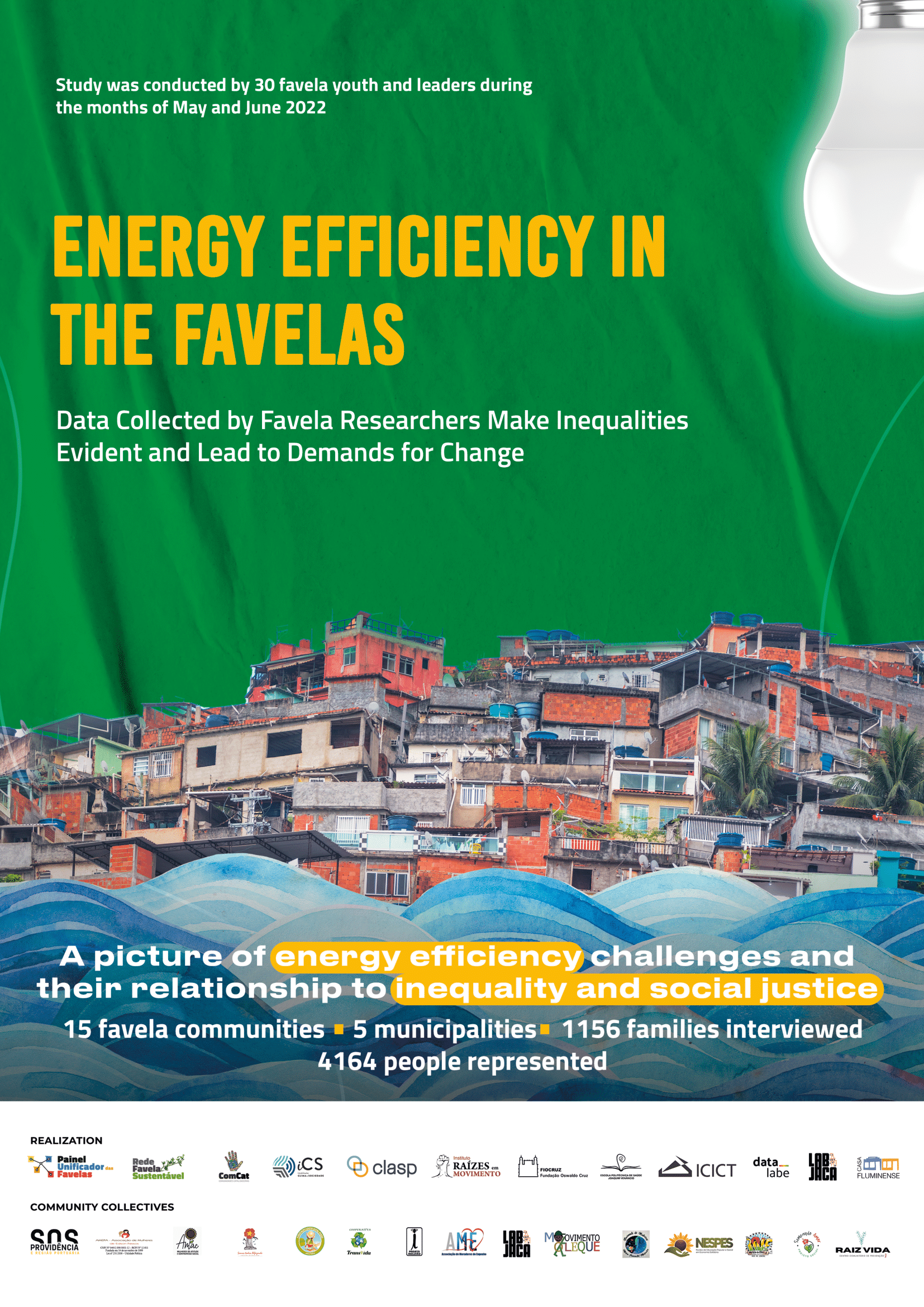
May 24, 2024 — A delegation of 19 community organizers from favelas across Greater Rio de Janeiro, including both youth and veteran leaders, along with 7 technical allies from the Sustainable Favela Network, has a busy agenda in Brasília during World Energy Week (May 27-29). They will be engaging in discussions focused on three critical agendas for a clean and just energy transition in Brazil. The delegation is accompanied by a group of national-level partner organizations, who together will realize a crucial debate on energy justice.
The group, which has been researching and developing energy solutions in favelas, published Energy Efficiency in the Favelas in 2023, which offers an otherwise inaccessible perspective on the energy injustice affecting their communities. The citizen-generated data project surveyed nearly 1200 households across 15 favelas in Greater Rio. Collectively, the communities represented by the delegation traveing to Brasília have over 1.2 million residents. Access the study here, with key findings below.
The schedule of events in Brasília includes a public meeting on the morning of May 27, in Plenary Room 16 of Annex II of Brazil’s Chamber of Deputies, offering an in-depth exploration of the research data alongside testimonies about affected residents and solutions developed by the communities themselves. Private meetings will take place with federal authorities from ANEEL (agency responsible for regulating electric energy in Brazil), the Ministry of Mines and Energy, the Ministry of Cities, the Parliamentary Environmental Front, and several federal deputies.
On the morning of May 29, World Energy Day, the delegation will participate in the public hearing “Just Energy Transition: The Social Role of Solar Energy” organized by the Federal Commission on Mines and Energy, with two of Rio’s leaders on the panel, in Plenary Room 14 of Annex II of the Chamber of Deputies.
Parliamentary aides, journalists, and all interested parties are welcome to attend both the meeting on the 27 and the hearing on the 29. See program below.
Favelas Generate Energy Solutions Beyond Data
In addition to presenting data and testimonials problematizing access and quality of electricity in their communities, the delegation includes four leaders who are generating solutions to the challenges mentioned. Luis Cassiano from Green Roof Favela will share the experience of a green roof in Parque Arará, North Zone of Rio, where temperatures beneath his roof are significantly lower than in the surrounding neighborhood in the heights of the summer. Otávio Barros from the Vale Encantado Cooperative will share the story of a biosystem responsible for treating the community’s sewage in Vale Encantado, along with the biodigester that generates gas for the cooperative’s kitchen and their solar panels. Nill Santos will tell the story of her Association of Women With Attitude and Social Commitment, providing support to victims of domestic violence, who found in solar energy a means of generating income and independence. And Dinei Medina will inspire—drawing from his experience with Brazil’s first solar energy cooperative in favelas, Revolusolar—an understanding of the immense potential that distributed generation, conducted within favelas, can bring to society as a whole.
Three Crucial and Interdependent Agendas
The Sustainable Favela Network delegation will focus on three agendas during World Energy Week in Brasília. They are:
- The renewal of electricity concessions, which in Brazil takes place every 30 years and is currently up for consideration in Congress, during which the group will address concerns regarding access to and the quality of electricity reaching favelas, and implications for the terms of concession contract renewals.
- Social tariff, which in Brazil is required to reach the most vulnerable, yet does not take place: the delegation will share how electricity has gained new centrality in favelas yet there is little effective access to an affordable tariff.
- Social solar energy: the delegation will fight for the adoption of and broad access to solar energy in favelas as a solution, including for the issues raised in the previous items, providing autonomy and sustainability to communities and contributing to society as a whole.
Public Meeting to Present Data and Insights from Across Greater Rio
The public meeting, organized by the Sustainable Favela Network delegation, is a space to provide a thorough presentation of the data, realities, and solutions from Rio’s favelas to parliamentary aides and journalists. It is a crucial complement to the specialists’ discussions on solar energy to take place at the public hearing. We encourage everyone to participate fully in both public events for a comprehensive lesson on the impact of energy on favela communities and the pathways to address the significant challenge of just energy transition in Brazil. The public meeting, titled “Energy Justice in the Favelas: On-the-Ground Data and Solutions,” will take place on May 27, 2024, from 9am-12pm in Plenary Room 16 of Annex II of the Chamber of Deputies.
Public Hearing to Focus on Social Solar on World Energy Day
The public hearing, solicited to congressional officials by the Sustainable Favela Network delegation and partners working on this issue, was convened by the Permanent Committee on Mines and Energy of Brazil’s National Congress through the office of Congressman Bandeira de Mello. The focus will be “Just Energy Transition – The Social Role of Solar Energy.” It will take place on May 29, 2024, World Energy Day, from 10am-1pm in Plenary Room 14 of Annex II of the Chamber of Deputies.
The following members and partners of the SFN delegation will be on the panel: Eduardo Avila, Executive Director of Revolusolar; José Gustavo Fávaro Barbosa Silva, representative of Lemon Energia, a climate tech company founded with the aim of democratizing access to sustainable energy for the entire Brazilian population; Kayo Moura, author of the Energy Efficiency in Favelas report and data coordinator at LabJaca, a research laboratory focused on citizen-generated data and narrative-building in favelas and peripheries; Nilcimar Santos from the Association of Women With Attitude and Social Commitment, the first solar installation empowering women in the municipality of Duque de Caxias, Greater Rio de Janeiro; and Rodrigo Faria, representative of Instituto Pólis, along with other specialists on social solar energy.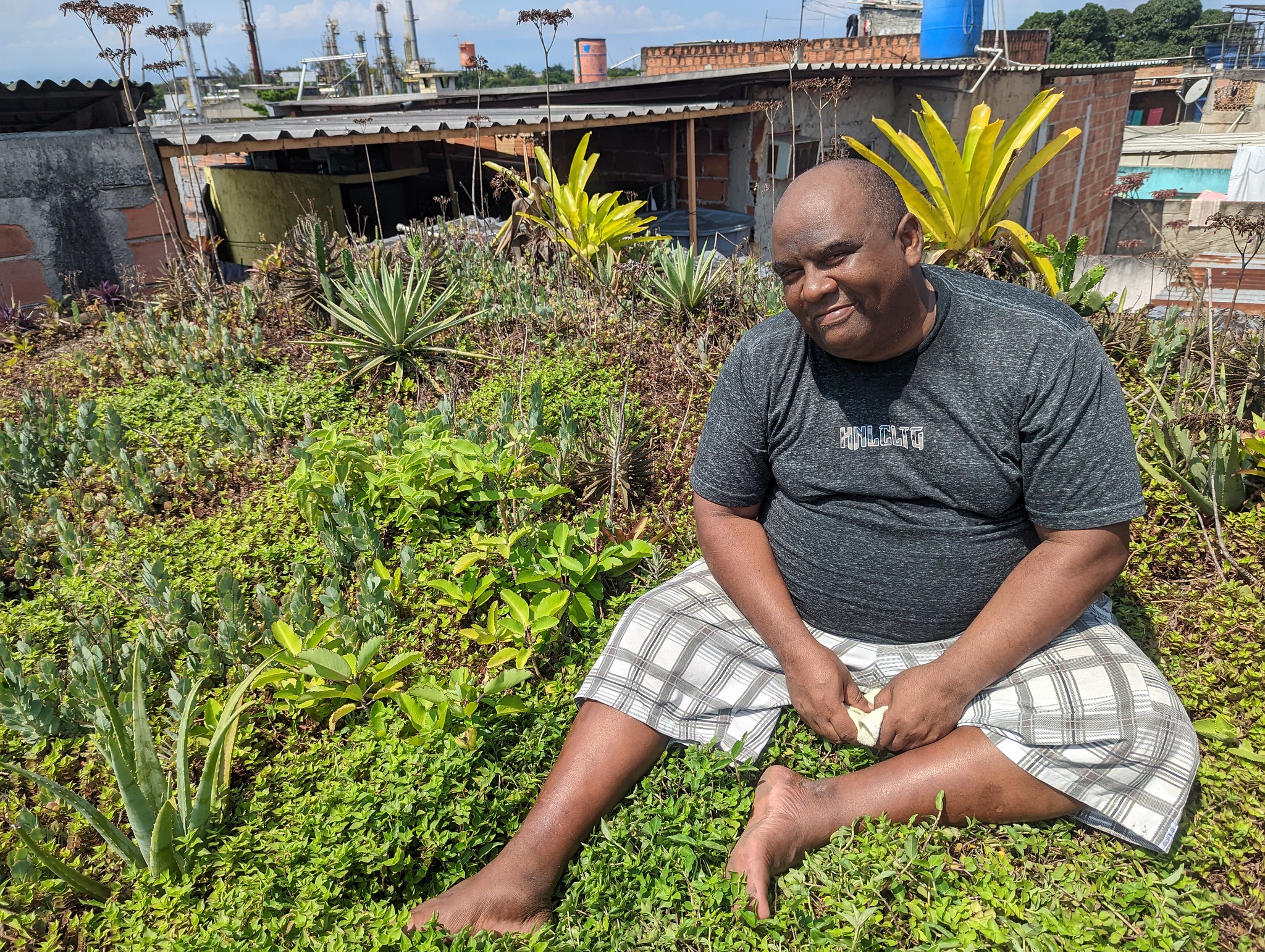
Schedule of Events
Monday, May 27
Time: 9:00am – 12:00pm
Description: Launch of World Energy Week—Public Meeting in Congress: “Energy Justice in the Favelas: On-the-Ground Data and Solutions,” the most comprehensive presentation of data, stories, and solutions to be held during the week on the topic of energy injustice, and the ideal complement to the topics that will be addressed at the Public Hearing on Wednesday (see below).
Location: Plenary Room 16, Annex II, Chamber of Deputies
Wednesday, May 29
Time: 10:00am – 1:00pm
Description: Organized by the Permanent Committee on Mines and Energy, Public Hearing in the National Congress on “Just Energy Transition: The Social Role of Solar Energy”
Location: Plenary Room 14, Annex II, Chamber of Deputies
Closed presentations will also be held with the Ministry of Mines and Energy, ANEEL, Ministry of Cities,the National Congress’s Environmental Front and individual federal deputies.
About the Study ‘Energy Efficiency in the Favelas’
The data presented in the report Energy Efficiency in the Favelas reflect the reality of 1,156 families (4,164 people) in 15 favelas from five municipalities across the Greater Rio metropolitan region, and specifically show the relationship between energy, poverty, and social inequality, focusing on the efficiency of service provision and use. The wealth of information produced by this analysis was striking even to those involved.
HIGHLIGHTS FROM THE DATA
Efficiency and Quality of Access
- 55.2% of people represented in the research are living below the poverty line.
- 41.5% of families earning up to half the minimum wage experienced blackouts lasting over 24 hours in the past three months.
- Families pay, on average, an electricity bill that is twice their average payment capacity.
- 31% of families experience energy poverty, with a disproportionate amount of the family budget going to pay the electric bill.
- 69% would choose to spend on food if their electric bills were reduced.
- The data show how clandestine connections are frequently the only means by which people can access energy. The poorest families, earning up to half a minimum wage, are shown to have the biggest proportion of clandestine connections. As income increases, the proportion of those who state they do not have a clandestine connection also increases.
- 68.7% are unfamiliar with the Social Electricity Tariff (TSEE).
- 59.55% of families meet the income criteria to qualify for the Social Tariff, but only 8.04% of families state they receive the benefit.
- 73% of families earning up to half a minimum wage state they do not complain or make requests to the utility, Light. As income increases, comfort in requesting services from the utility increases: only 33% of those earning over four minimum wages say they do not make complaints to Light.
Energy-Efficient Appliances and Habits
- Air conditioning is responsible for over half (51.4%) of energy consumption in the sample, followed by electric showers (13.8%) and refrigerators (13.6%).
- Among those interviewed, 78% always remember to turn off the lights when leaving a room and 67% choose LED bulbs.
- 50.6% state they know what the National Energy Conservation Label (ENCE) is.
About the Sustainable Favela Network
The Sustainable Favela Network consists of over 500 members, including over 300 community mobilizers from 295 favelas and communities in the Greater Rio region, along with technical allies. 70% of its members are Black, and 66% are women. We work collectively in the fight for climate justice by harnessing the potential of favelas as sustainable communities. Our goal is to foster existing strengths within favelas to propel, realize, and amplify their potential. The SFN operates under the perspective of favelas as sources of solutions, also for human sustainability, based on the concept of Asset-Based Community Development, which focuses on developing residents and the area they live in according to their strengths. Click here to learn more about the network and the delegation. The Sustainable Favela Network’s managing organization is Catalytic Communities (CatComm), winner of the National Federation of Architects and Urbanists (FNA) award in 2022 for its work carrying out strategic support projects for favela mobilizers in the Greater Rio area since 2000.
About the Delegation
The Sustainable Favela Network ‘Heading to Brasília for Just Energy’ delegation is composed of members from the following Rio de Janeiro organizations: A.M.I.G.A.S., Alfazendo, Association of Women With Attitude and Social Commitment (AMAC), Catalytic Communities, Conexões Periféricas-RP, Vale Encantado Cooperative, Galeria Providência, LabJaca, Favela Museum (MUF), Projeto Inclusão, Revolusolar, Semeando Amor/PCS, and Green Roof Favela.
National Partners
In addition to the members from Rio de Janeiro, the following national-level organizations were crucial in developing the program and will be actively involved during the Energy Week activities in Brasília: Instituto Internacional Arayara, ClimaInfo, Instituto de Estudos Socioeconômicos (Inesc), Instituto Clima e Sociedade (iCS), Instituto Pólis, Lemon Energy, Nordeste Potência and Revolusolar.
Contact
International/English: press@catcomm.org / +55-21-991976444
Instagram: www.instagram.com/favelasustentavel
Email: rede@favelasustentavel.org
Press Support Materials
-
- “Get to Know Us” Flyer (in Portuguese)
- More about us (in Portuguese)
- Delegation mini-bios (in Portuguese)
- Energy Efficiency in Favelas report in English
- Energy Efficiency in Favelas report in Portuguese
- Images [feel free to use, attributing to the Sustainable Favela Network | CatComm]
- Video images [feel free to use, attributing to the Sustainable Favela Network | CatComm]
- Documentary about the course “Researching and Monitoring Energy Justice in Favelas” which generated the Energy Efficiency in Favelas report
*The Sustainable Favela Network (SFN), Favelas Unified Dashboard, and RioOnWatch are initiatives of the NGO Catalytic Communities (CatComm).

